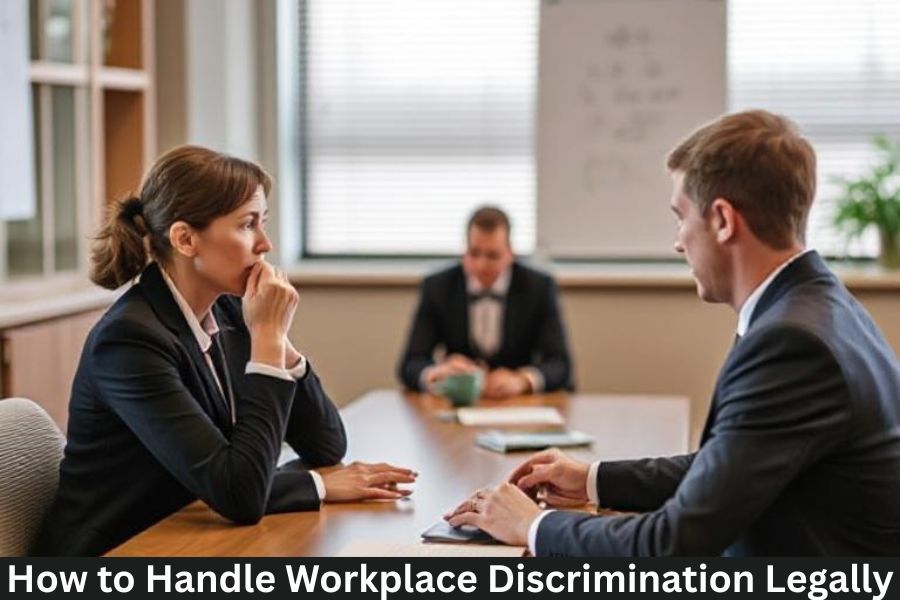Workplace discrimination remains one of the most challenging issues employees face today. Whether it’s based on gender, race, religion, disability, or age — no one should be treated unfairly at work. Yet, despite strict laws, many people still encounter bias, harassment, or unequal opportunities in the workplace.
This guide explains how to handle workplace discrimination legally — from recognizing it to taking the right legal steps to protect your rights.
1. Understanding Workplace Discrimination
Workplace discrimination occurs when an employee is treated unfavorably or unfairly because of personal characteristics protected by law. It can happen at any stage — during hiring, promotion, compensation, or termination.
Common Types of Discrimination:
- Gender discrimination: Unequal pay, bias in promotions, or harassment based on gender.
- Racial or caste discrimination: Favoritism or exclusion based on ethnicity or community.
- Age discrimination: Being overlooked for opportunities due to age.
- Disability discrimination: Denying reasonable accommodations or job access.
- Religious discrimination: Restricting religious practices or making biased remarks.
- Sexual orientation discrimination: Harassment or exclusion based on sexual identity.
Discrimination is not always overt — it can be subtle, systematic, or disguised as “policy.”
2. Recognizing Signs of Discrimination at Work
Before taking action, it’s important to recognize discriminatory behavior.
Look out for:
- Being passed over for promotions despite merit
- Receiving unfair performance reviews without clear justification
- Unequal pay for the same job role
- Being excluded from meetings or decision-making
- Offensive comments or jokes targeting your identity
- Sudden termination or demotion without valid reason
These patterns — when consistent — may indicate discrimination under employment law.
3. Know Your Legal Rights
Every employee has the right to equality, dignity, and safety at work. In India, multiple laws protect employees from discrimination and harassment in the workplace.
Key Legal Protections Include:
- Constitution of India (Articles 14–16): Guarantees equality and prohibits discrimination.
- Equal Remuneration Act, 1976: Ensures equal pay for men and women doing the same work.
- Sexual Harassment of Women at Workplace (Prevention, Prohibition and Redressal) Act, 2013: Protects against sexual harassment.
- Rights of Persons with Disabilities Act, 2016: Prevents discrimination against disabled employees.
- Industrial Employment (Standing Orders) Act, 1946: Prohibits unfair labor practices.
Knowing your rights empowers you to act confidently and legally.
4. Document Everything
When you experience workplace discrimination, keep detailed records. Documentation becomes crucial evidence in legal proceedings or HR investigations.
What to Record:
- Dates, times, and locations of incidents
- Names of people involved
- Emails, messages, or written communications
- Witness statements (if any)
Keep copies securely — they’ll strengthen your case if you file a complaint later.
5. Report Internally First
Most organizations have internal grievance mechanisms to handle discrimination complaints.
Start by reporting the issue to:
- Your HR department
- Immediate supervisor or manager (if not the perpetrator)
- Internal Complaints Committee (ICC) (especially for sexual harassment cases)
Submit your complaint in writing, describing incidents clearly and factually.
6. Use the Internal Complaints Committee (ICC)
Under the POSH Act (2013), every company with more than 10 employees must have an Internal Complaints Committee to investigate sexual harassment cases.
The ICC:
- Must complete its inquiry within 90 days
- Has the authority to recommend disciplinary action
- Can maintain strict confidentiality throughout the process
You have the right to request a fair hearing and to present your evidence during the inquiry.
7. Approach Labor Authorities or Commissions
If internal measures fail or the discrimination continues, escalate the issue legally.
You Can File Complaints To:
- Labor Commissioner’s Office: For unfair labor practices or pay discrimination.
- National or State Human Rights Commission (NHRC/SHRC): For severe discrimination or harassment.
- National Commission for Women (NCW): In cases of gender-based discrimination.
- Office of the Chief Commissioner for Persons with Disabilities: For disability-related complaints.
Each body has specific jurisdiction, so choose based on the nature of the issue.
8. File a Legal Complaint or Case
If the issue remains unresolved, you can take formal legal action.
Steps to Take:
- Consult an employment lawyer experienced in labor and discrimination law.
- Send a legal notice to your employer, outlining the discrimination and seeking resolution.
- File a case in the appropriate labor court, tribunal, or civil court.
- Provide documented evidence of discrimination and employer negligence.
Lawsuits can take time, but they help set precedents and ensure justice.
9. Alternative Dispute Resolution (ADR)
If you want to avoid lengthy legal battles, consider mediation or arbitration.
ADR helps reach a settlement with the employer through:
- Neutral mediators
- Confidential discussions
- Mutual agreements
It’s faster, less stressful, and often preserves professional relationships.
10. Whistleblower Protection
If you report unethical practices, remember that you’re protected under The Whistle Blowers Protection Act, 2014.
Employers cannot legally retaliate by:
- Demoting you
- Terminating employment
- Harassing or blacklisting you
Any such act is punishable under Indian law.
11. Seek Legal Assistance Early
Don’t wait until the situation worsens. Contact a labor lawyer or legal aid service for professional advice.
They can:
- Help you file proper complaints
- Guide you through documentation
- Represent you before authorities
Free legal aid is available through District Legal Services Authorities (DLSA) for those who qualify.
12. Protect Your Mental and Emotional Health
Discrimination can deeply affect your mental well-being. Alongside legal steps:
- Seek counseling to cope with stress and trauma
- Join employee support groups
- Take time off if needed to recover emotionally
Standing up for your rights doesn’t just require legal strength — it also needs emotional resilience.
13. Preventive Measures for Employees
To prevent discrimination:
- Stay informed about company policies
- Participate in diversity and inclusion programs
- Encourage open communication with HR
- Speak up early — silence allows injustice to spread
14. Preventive Measures for Employers
Organizations must also ensure equality by:
- Conducting regular sensitivity training
- Implementing anti-discrimination policies
- Creating safe and confidential complaint systems
- Promoting merit-based evaluations
Building an inclusive workplace benefits everyone — legally, morally, and productively.
15. Conclusion
Workplace discrimination is not just unethical — it’s illegal. Every employee deserves respect, equality, and fair treatment, regardless of gender, religion, or background. If you ever face bias, don’t ignore it.
Document, report, and if necessary, take legal action. Remember, standing up against discrimination doesn’t just protect your rights — it paves the way for a more inclusive and just workplace for all.
FAQs
Q1: Can I be fired for complaining about discrimination?
No. Retaliation against employees who file discrimination complaints is illegal under labor and human rights laws.
Q2: How long do I have to file a discrimination complaint?
Generally, you should file within three months of the incident, though some laws allow extensions for valid reasons.
Q3: What should I include in a discrimination complaint?
Include dates, names, specific incidents, evidence, and how the discrimination affected you.
Q4: Can men file sexual harassment complaints under Indian law?
Yes, men can file complaints for workplace harassment under general labor and criminal laws, though the POSH Act mainly protects women.
Q5: What compensation can I get after proving discrimination?
Depending on the case, you may receive reinstatement, back pay, damages for emotional distress, or policy reforms in your workplace.


